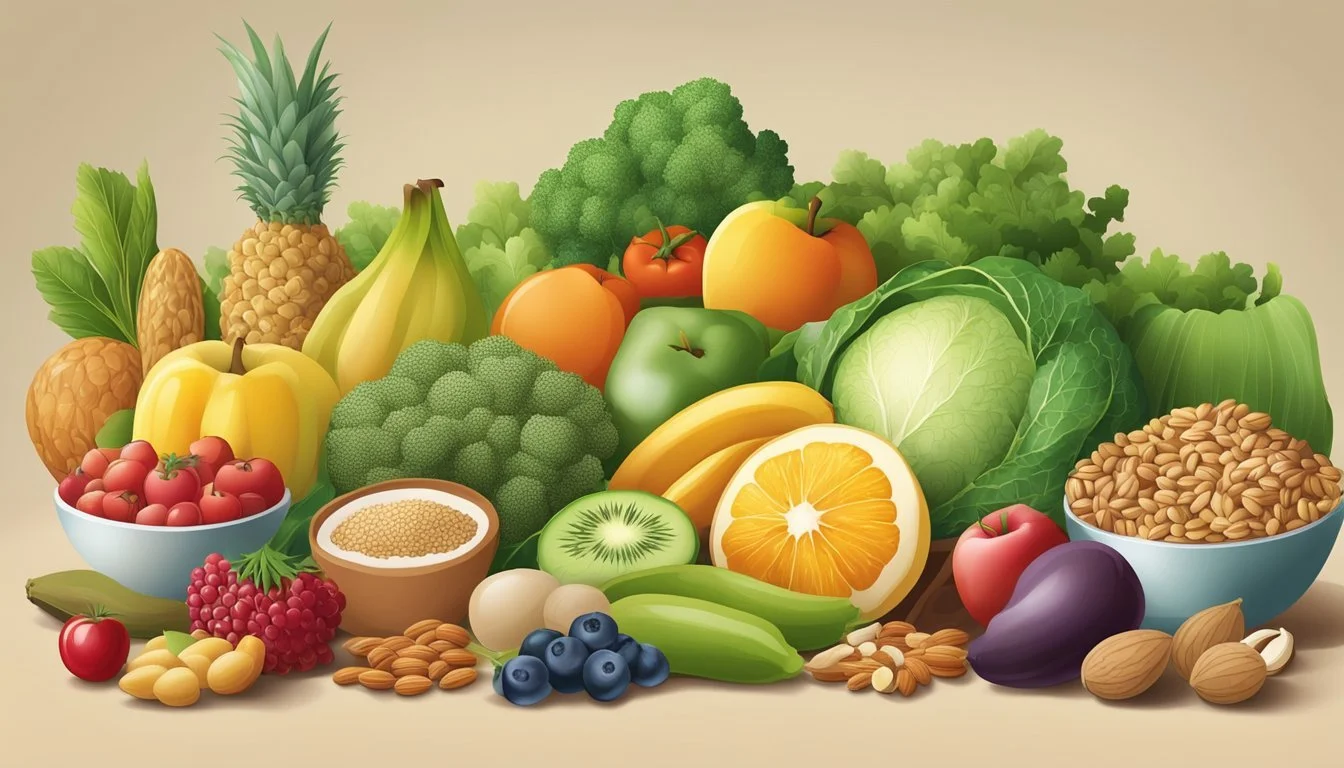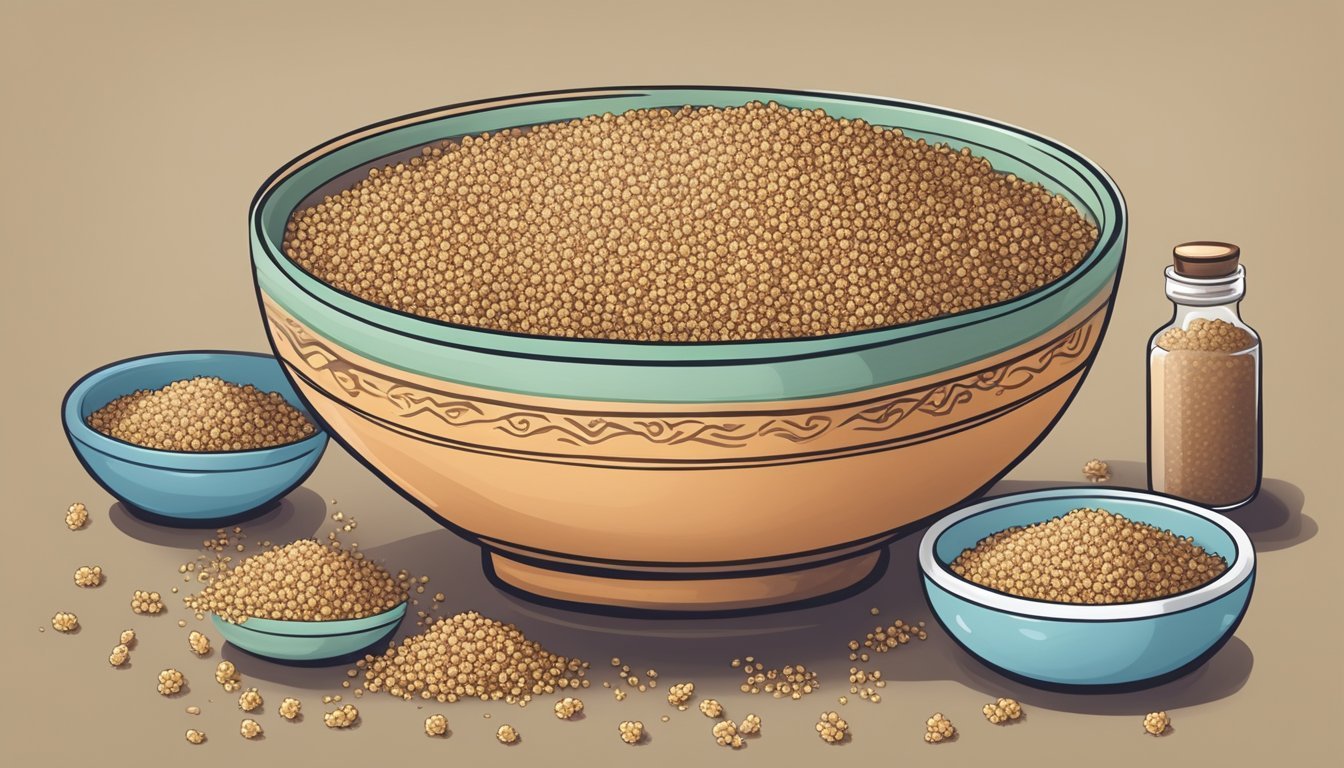Fertility-Boosting Foods: What to Eat When Trying to Conceive
Understanding the role of diet in fertility can offer valuable insights for those looking to conceive. While no food can guarantee pregnancy, certain nutrients and dietary patterns may enhance fertility. Eating a balanced diet rich in specific nutrients can support reproductive health and improve the chances of conceiving.
Incorporating foods known to positively impact fertility into daily meals can be a proactive approach for those trying to conceive. Both men and women can benefit from a diet that supports overall reproductive health, potentially increasing their chances of starting or expanding their family.
1) Leafy Green Vegetables
Leafy green vegetables are a vital part of a fertility-boosting diet. They are packed with vitamins and minerals essential for reproductive health.
Spinach is a popular choice, rich in folate, iron, and magnesium. These nutrients support ovulation and may improve overall uterine health.
Kale is another excellent option. It contains vitamins A, C, K, and fiber. These support hormonal balance and may reduce inflammation.
Swiss chard is notable for its high vitamin K content. Just one cup can provide over 400% of the recommended daily value of this vitamin, which is crucial for blood clotting and bone health.
Broccoli and bok choy also make great additions. They offer a range of nutrients, including vitamin C and calcium, which support egg quality and overall reproductive health.
Incorporating a variety of these leafy greens into daily meals can provide the nutrients needed to support fertility and prepare the body for a healthy pregnancy.
2) Berries
Berries, such as blueberries and raspberries, are loaded with natural antioxidants and anti-inflammatory phytonutrients. These compounds are beneficial for both female and male fertility.
Berries are rich in folate and vitamin C. Folate is crucial for fetal development, while vitamin C boosts the immune system and promotes overall reproductive health.
In addition to these vitamins, berries are a good source of fiber. Fiber aids in weight management, which is important since a healthy weight can improve fertility outcomes.
Berries are also versatile and can be easily added to a variety of meals. They can be enjoyed fresh, in smoothies, atop cereals, or mixed into yogurts.
3) Nuts and Seeds
Nuts and seeds are essential components of a fertility-boosting diet. They are rich in healthy fats, protein, and essential nutrients that support reproductive health.
Walnuts, for example, are a great source of omega-3 fatty acids, which can improve sperm quality in men and support hormone balance in women.
Almonds are high in vitamin E, known for its role in protecting sperm and egg DNA from oxidative stress.
Sunflower seeds provide zinc and folate, both crucial for maintaining healthy sperm and eggs. Zinc is particularly vital for male fertility, as it contributes to testosterone production and sperm count.
Flaxseeds and chia seeds are excellent sources of omega-3s and antioxidants, helping to reduce inflammation and support hormone function.
Pumpkin seeds are packed with zinc and other essential minerals, promoting the health of the reproductive organs. They also contain magnesium, which helps regulate hormone levels.
Incorporating a variety of nuts and seeds into daily meals can enhance overall fertility. They can be added to salads, smoothies, or eaten as snacks, making them a versatile and beneficial choice for anyone trying to conceive.
4) Avocado
Avocado is rich in healthy fats, which are essential for hormone production. These fats help in the production of hormones like estrogen and progesterone, which are critical for fertility.
This fruit also contains a variety of vitamins and minerals. Vitamins E and C in avocados play a role in improving sperm quality and overall reproductive health.
The folate in avocados is known to support fetal development. Folate is a crucial nutrient for women who are trying to conceive as it helps reduce the risk of birth defects.
Fiber-rich avocados can aid in weight management. Maintaining a healthy weight is important for both male and female fertility, and a balanced diet can contribute to overall reproductive health.
5) Whole Grains
Whole grains are an important part of a fertility-boosting diet. They provide essential nutrients and help regulate blood sugar levels. This is crucial when trying to conceive, as stable blood sugar can enhance hormone function and improve reproductive health.
Some good options for whole grains include oatmeal, brown rice, buckwheat, whole-wheat bread, and barley. These foods are high in fiber, which aids in digestion and helps maintain a healthy weight – both important factors for fertility.
Whole grains are also rich in vitamins and minerals such as B vitamins and iron. These nutrients support energy levels and overall health, further contributing to a fertile environment in the body. Replacing refined grains with whole grains can make a significant difference in nutritional intake.
Incorporate a variety of whole grains into meals. For breakfast, consider a bowl of oatmeal or a slice of whole-wheat toast. Lunchtime can include a quinoa salad or brown rice bowl. For dinner, try adding barley to soups or using whole-grain pasta.
Eating a balanced diet rich in whole grains ensures the body receives necessary nutrients, supporting the overall goal of enhancing fertility. This makes whole grains a valuable part of a pre-pregnancy diet.
6) Salmon
Salmon is a highly beneficial food for those looking to boost fertility. It is rich in omega-3 fatty acids, which are crucial for reproductive health. Omega-3s help regulate hormones, reduce inflammation, and enhance blood flow to reproductive organs.
This fish is also an excellent source of protein, providing the body with essential building blocks. Protein is important for cell repair and overall bodily functions, which can indirectly support fertility.
Additionally, salmon contains vitamins D and B12. Vitamin D is linked to improved fertility outcomes, and vitamin B12 is vital for maintaining proper neurological function and supporting red blood cell formation.
Salmon from wild-caught sources is often recommended over farm-raised varieties. Wild salmon generally has higher levels of nutrients and fewer contaminants, offering more benefits for those trying to conceive.
Incorporating salmon into a balanced diet can be relatively simple. It can be baked, grilled, or even enjoyed as sashimi. This versatility makes it easy to add this fertility-boosting food to various meals.
Eating salmon one to two times a week can provide the necessary nutrients without overdoing calorie intake. It is a delicious and practical choice for anyone on their fertility journey.
7) Eggs
Eggs are a nutrient-dense food that can support fertility in both men and women. They contain essential vitamins and minerals that contribute to overall reproductive health.
Egg yolks supply almost all of an egg's iron, calcium, zinc, vitamin B6, folate, and vitamin B12. These nutrients are vital for hormone regulation and egg quality.
Eggs are also an excellent source of protein, which is crucial for cell growth and repair. Including eggs in the diet provides the body with the necessary building blocks to support a healthy pregnancy.
Pasture-raised eggs are particularly beneficial. They are rich in omega-3 fatty acids, including EPA and DHA. These healthy fats support hormone balance and reduce inflammation, which can enhance fertility.
Vitamin D found in egg yolks helps regulate menstrual cycles and improve the chances of conception. It is recommended to consume two to three eggs per day to optimize these benefits.
Incorporating eggs into various meals, such as omelets or salads, can be a simple yet effective way to boost fertility. Their versatility makes them easy to include in a balanced diet.
Eggs offer numerous nutrients that play a critical role in fertility. Regular consumption can be a valuable addition to a fertility-focused diet.
8) Sweet Potatoes
Sweet potatoes are a nutritious addition to a fertility-friendly diet. Rich in vitamin B6 and beta-carotene, they contribute to hormone regulation. This can potentially aid in balancing progesterone levels, which is important for ovulation.
High in beta-carotene, sweet potatoes provide a plant-based precursor to vitamin A. Vitamin A is essential for maintaining healthy reproductive tissues.
Fiber content in sweet potatoes supports digestive health, which can indirectly influence fertility by improving nutrient absorption. Including sweet potatoes in meals offers a tasty and beneficial option for those trying to conceive.
9) Quinoa
Quinoa is a valuable addition to a fertility-boosting diet. Rich in antioxidants such as quercetin and kaempferol, it may protect reproductive cells from free radical damage. Free radicals can contribute to oxidative stress, which has been linked to infertility.
Quinoa provides a good source of plant-based protein. Protein is essential for overall health and particularly important when trying to conceive. It ensures that the body has the building blocks it needs for cell repair and hormone production.
This grain is also high in fiber. Fiber aids in maintaining regular digestive health, which can support nutrient absorption. Better absorption of nutrients like iron, magnesium, and zinc can be beneficial for reproductive health.
Additionally, quinoa contains essential nutrients like folate. Folate is crucial for preventing neural tube defects in early pregnancy and enhances overall reproductive health. It's one of the critical micronutrients to focus on when trying to conceive.
Including quinoa in meals can be both versatile and simple. It can be used as a base for salads, served as a side dish, or incorporated into main dishes. Its mild flavor makes it easy to mix with various ingredients while providing nutritional benefits.
10) Greek Yogurt
Greek yogurt is a beneficial addition to the diet for those trying to conceive. It is rich in protein, which is essential for hormone production and maintaining healthy reproductive tissues.
This dairy product is also packed with calcium and vitamin D. Both nutrients are important for bone health and play a role in the reproductive processes.
Moreover, Greek yogurt contains probiotics. These beneficial bacteria help maintain gut health, which can improve overall nutrient absorption.
Additionally, it provides a good source of essential fatty acids that support hormonal balance. Greek yogurt can be enjoyed as a snack, in smoothies, or as part of a meal, making it a versatile option for boosting fertility.
Nutritional Benefits for Fertility
Consuming specific nutrients can significantly improve fertility by supporting reproductive health and hormonal balance. Some of the most impactful nutrients include essential vitamins, minerals, and antioxidants.
Vitamins and Minerals Essential for Conception
Vitamins and minerals play a crucial role in enhancing fertility. Folic acid is particularly important for women as it helps prevent neural tube defects. Vitamin D is also vital, as it supports reproductive health and is linked with improved fertility rates.
Zinc is essential for both men and women. It supports sperm quality and quantity in men and helps with ovulation in women. Iron and calcium are also critical, as they support overall reproductive health and proper egg and sperm development.
Omega-3 fatty acids found in fish oil enhance ovarian function and improve sperm quality. Vitamin B6 and B12 are essential for hormonal regulation and healthy pregnancy outcomes.
The Role of Antioxidants
Antioxidants combat oxidative stress, which can negatively impact fertility. Vitamin C and E are powerful antioxidants that protect sperm and egg cells from damage. Coenzyme Q10 (CoQ10) is another potent antioxidant that boosts fertility by improving mitochondrial function in egg cells and enhancing sperm motility.
Fruits and vegetables, rich in antioxidants like beta-carotene and selenium, can improve fertility. These nutrients protect reproductive cells from oxidative damage, enhancing the chances of conception.
Lycopene, found in tomatoes, is particularly beneficial for improving sperm health. Flavonoids and polyphenols found in berries also offer significant antioxidant properties that support fertility.
Hormonal Balance and Diet
Maintaining hormonal balance is crucial in boosting fertility through diet. Key elements include omega-3 fatty acids and managing insulin levels, which play significant roles in regulating hormones.
Impact of Omega-3 Fatty Acids
Omega-3 fatty acids are essential fats found in foods like salmon, anchovies, and sardines. These fats support hormone balance by reducing inflammation and promoting healthy cell membranes. The anti-inflammatory properties of omega-3s can lower stress hormones that negatively impact fertility.
Incorporating foods rich in omega-3s into daily meals can help maintain regular menstrual cycles. Chia seeds, flaxseeds, and walnuts are also good plant-based sources. Omega-3 supplements are another alternative, but it is always best to consult a healthcare provider before starting any new supplement regimen.
Managing Insulin Levels
Proper insulin management is crucial for hormonal balance, especially for individuals with conditions like polycystic ovary syndrome (PCOS). Insulin resistance can disrupt menstrual cycles and ovulation. To keep insulin levels in check, it is important to focus on a diet rich in whole grains, lean proteins, and vegetables.
Avoiding refined sugars and processed foods can help stabilize blood sugar levels. Beans, lentils, and chickpeas are excellent choices as they provide fiber and protein, aiding in blood sugar stabilization. Regular physical activity coupled with a balanced diet further enhances insulin sensitivity, promoting overall hormonal health.







